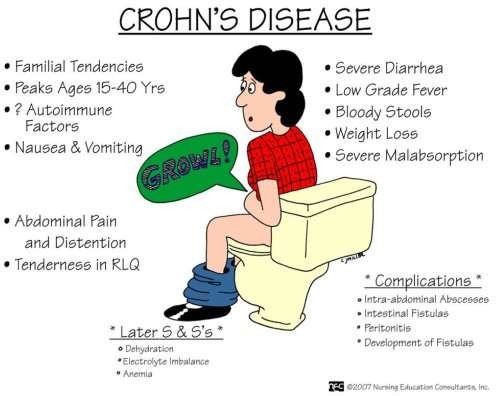A nurse is providing teaching to a client about the adverse effects of sertraline. Which of the following adverse effects should the nurse include?
Metallic taste in the mouth
Excessive sweating
Increased urinary frequency
Dry cough
The Correct Answer is B
A. Incorrect. A metallic taste in the mouth is not a common adverse effect of sertraline.
B. Correct. Excessive sweating (diaphoresis) is a potential adverse effect of sertraline and other selective serotonin reuptake inhibitors (SSRIs).
C. Incorrect. Increased urinary frequency is not commonly associated with sertraline.
D. Incorrect. A dry cough is not a known adverse effect of sertraline.
Nursing Test Bank
Naxlex Comprehensive Predictor Exams
Related Questions
Correct Answer is ["B","D","E"]
Explanation
The nurse should discuss the following dietary recommendations with the client who has Crohn's disease:
Avoid eating fried, fatty foods and large meals: Fried and fatty foods can be difficult to digest and may worsen symptoms of diarrhea and abdominal pain. Consuming large meals can also put additional strain on the digestive system.
Limit high fiber foods, such as beans, popcorn, and seeds: High fiber foods can be challenging to digest and may exacerbate symptoms of Crohn's disease. Limiting these foods can help reduce gastrointestinal irritation and promote symptom relief.
Take a vitamin supplement daily with a meal: Crohn's disease can lead to nutrient deficiencies due to malabsorption. Taking a daily vitamin supplement with a meal can help ensure that the client receives essential nutrients and maintain overall nutritional status.
The following options are not appropriate dietary recommendations for a client with Crohn's disease:
- Drinking dairy and effervescent sodas for hydration: Dairy products can trigger symptoms in some individuals with Crohn's disease, especially if they have lactose intolerance. Effervescent sodas may contain carbonation and artificial sweeteners that can aggravate symptoms. Encouraging non-dairy sources of hydration, such as water or herbal teas, would be more appropriate.
- Enjoying fast food restaurants only if dining with friends: Fast food options are generally high in fat, sodium, and other additives that may worsen symptoms in individuals with Crohn's disease. It is advisable to limit or avoid fast food consumption altogether, regardless of whether dining alone or with others.

Correct Answer is B
Explanation
Choice B rationale:
Teaching the client to tighten a muscle group, release the tension, and then move to the next one is a technique used in progressive muscle relaxation (PMR) PMR is a stress management technique that involves tensing and relaxing different muscle groups to reduce muscle tension and promote relaxation. This method helps individuals become more aware of the sensations associated with muscle tension and relaxation, making it an effective strategy for managing anxiety and stress.
Choice A rationale:
Thinking about a positive outcome to a stressful situation is a cognitive-behavioral technique that can help shift the client's focus from negative thoughts to positive ones. While this technique can be beneficial, it does not specifically pertain to progressive relaxation as described in choice B.
Choice C rationale:
Picturing taking the stress and pushing it out of the feet is a visualization technique, which can be helpful for some individuals in managing stress. However, it is not a component of progressive relaxation as described in choice B.
Choice D rationale:
Focusing on a pleasant memory and expressing emotions in writing is a form of journaling or expressive writing, which can be a therapeutic technique for managing emotions and stress. While it can be a helpful strategy, it is not the same as progressive relaxation involving muscle tension and release.
Whether you are a student looking to ace your exams or a practicing nurse seeking to enhance your expertise , our nursing education contents will empower you with the confidence and competence to make a difference in the lives of patients and become a respected leader in the healthcare field.
Visit Naxlex, invest in your future and unlock endless possibilities with our unparalleled nursing education contents today
Report Wrong Answer on the Current Question
Do you disagree with the answer? If yes, what is your expected answer? Explain.
Kindly be descriptive with the issue you are facing.
